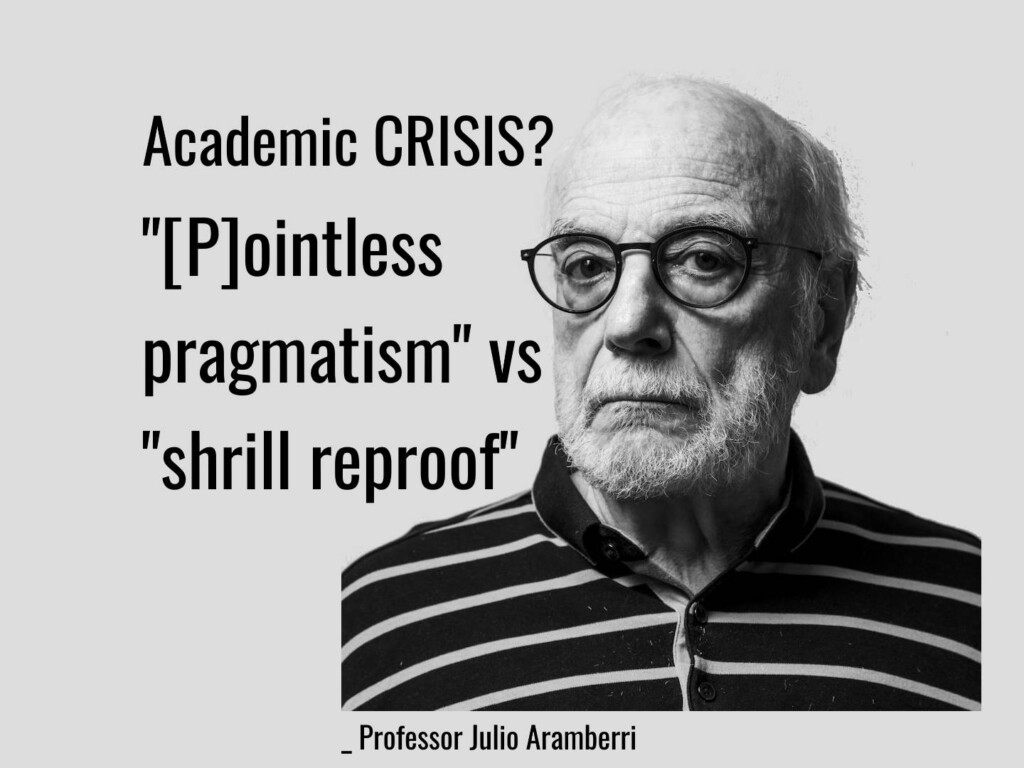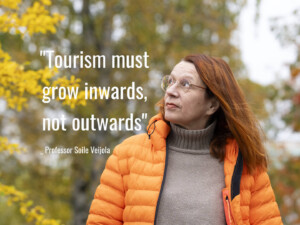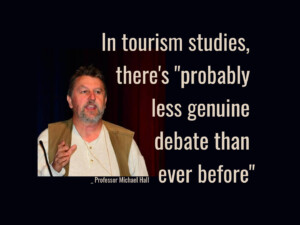Prof Julio Aramberri on freedom, progress, and academia’s ‘scissors crisis’

Julio Aramberri reckons contemporary tourism academia tends to focus on either “pointless pragmatism” or “shrill reproof”; the excesses of ‘Right’ and ‘Left’.
But ‘progress’ is nuanced and can be pointed to in amusing ways: “Little could Marx imagine that the wishful ‘workers of all lands, unite’ carved in his Highgate grave would come true … on the sunny beaches and while wearing swimsuits.”
Saverio Bertolucci and Peter Smith interviewed Prof Aramberri for a Tourism’s Horizon Interview. For this “Good Tourism” Insight, here’s a short reflection by Jim Butcher. [The full transcript is on Substack.]
Contents
Who is Professor Julio Aramberri?
Julio Aramberri recently returned to his native Spain after a lifetime engaged with the world of tourism; as a tourist, as Spanish state tourism executive, and as an academic.
Followers of discussions on tourism in the universities will know that Professor Aramberri has swum against the tide. He has written, often in uncompromising fashion, against mantras related to sustainability, the influence of ‘postmodernism’ in the universities, and much else.
Full disclosure: I’m in agreement with his perspectives on these and other things too, and was especially glad we were able to get this interview.
Freedom to, freedom from, freedom conflated
As a child of Franco’s dictatorship in Spain, the freedoms — material and political — available over the border in France, were attractive to young Julio.
Equally attractive was the prospect of sexual freedom. He recalls the lure of a free press, in the form of a French magazine featuring Brigitte Bardot ‘au naturel’. Soon tourism was to bring “mythically blonde Swedish girls” to the Spanish resorts, to the delight of Julio and his friends
It is striking to me that freedom is too rarely affirmed as a positive thing in the discussions of tourism we have in the universities. People’s freedom to travel for leisure often seems to be in a zero sum tussle against the freedom from tourism for others burdened by so-called ‘overtourism’.
As Prof Aramberri alludes to in comments critical of the academic influence of the late French thinker Michel Foucault, tourists are studied as links in a chain of interpersonal and intercultural power relations. Or as carriers of ‘impacts’ in a close-to-zero sum contest with the environment. Freedom is readily conflated with consumerism and mass tourism’s growth, both presented as spectres haunting the planet.
Prof Aramberri is critical of what he sees as postmodern, liberal academia’s tendency to focus on freedom from tourism, and is sanguine about the freedom to holiday.
How far academia itself can claim to be liberal in a true sense is up for debate. Aramberri cites the rise of corporate DEI (diversity, equity, and inclusion) committees in the modern university, suggesting that the parameters of acceptable thinking are subject to a degree of moral policing and censure along identitarian lines.
Again freedom — this time a culture of academic freedom — is a concern of Aramberri’s. He is absolutely right to be concerned.
Don’t miss other “GT” posts tagged ‘Education and training’
Progress = creative destruction
Julio Aramberri opposed Franco’s regime, and at different times took the New Left and Trotskyist positions; very different, but sharing an attempt to forge a mass people’s politics opposed to both the capitalists in the West and the Stalinists in the East.
The subsequent trajectory of his politics runs counter to that of many former (New) Left adherents, some of whom have morphed into members of the “professional-managerial class”, who, having given up on championing workers, seek to reform their behaviour and consumption.
Others turned to an environmentalism committed to degrowth.
Instead, Prof Aramberri came to see economic advancement and the securing of bourgeois and material freedoms as important goals for Spanish society. His own role in working to promote tourism for the post-Franco democracy may have further convinced him that ‘concrete jungles’ on the Spanish Costas with decent prospects are better than rural poverty, and better able to sustain hard-won democratic rights.
Detractors characterise, and caricature, Spain’s tourism revolution as destructive of the environment and the ‘real’ Spain. But for Aramberri it was a time of substantial, though not unqualified, progress.
The Romantics’ notion of sleepy fishing villages disfigured by poorly planned monstrosities in a developers’ free-for-all is less than half the story. All development, and all progress, involves destruction and creation simultaneously. The one-eyed critic whose vision focuses only on the former is no more progressive than the sharp-eyed corporate who measures progress by the latter alone.
Don’t miss other “GT” posts tagged ‘Infrastructure & development’
When academic traditions talk past each other
Elsewhere, Julio Aramberri has written about a ‘scissors crisis’ in academia, both as it pertains to tourism and generally. On the one side we have a managerialist tradition of research focused on ‘how to’ improve performance and profitability. On the other we have a social science based ‘why’ tradition, focused on cultural critique.
For Aramberri, “While the former veer towards pointless pragmatism, the latter glide into shrill reproof of the present world”.
In some ways this is a plea to look to an older tradition of enquiry, ‘political economy’, that Aramberri knows well. This original Marxist tradition sought out a dialectical relationship between economics and politics; the material and the ideological.
More prosaically, what Prof Aramberri has identified in the academy is surely important for tourism: When academic traditions talk past each other this can result in moralistic disdain for the ‘neoliberal’ industry and its consumers on one side, and Gradgrindian business techniques sold as profound ‘theory’ on the other side.
Some of us involved with Tourism’s Horizon: Travel for the Millions think that Aramberri is right. Others disagree. But there is one point I took from his interview that I think we all agree on. It’s the single premise of the project: Prof Aramberri opposes the implicit objectification of the masses as dupes of consumerism and their reduction to walking ‘impacts’ on the environment.
Perhaps this is a product of his scepticism of the authoritarian politics of Left and Right that treat people as means rather than ends … plus a healthy dose of humanism. Regardless, if you are looking for a defender of mass tourism as something good, something human — let’s call it progress — Aramberri is your man.
Don’t miss all the other great “Good Tourism” Insight Interviews
What do you think?
Share your own thoughts in a comment below. (SIGN IN or REGISTER first. After signing in you will need to refresh this page to see the comments section.)
Or write a “GT” Insight or “GT” Insight Bite of your own. The “Good Tourism” Blog welcomes diversity of opinion and perspective about travel & tourism, because travel & tourism is everyone’s business.
“GT” doesn’t judge. “GT” publishes. “GT” is where free thought travels.
If you think the tourism media landscape is better with “GT” in it, then please …
About the author
Jim Butcher is a lecturer and writer who has written a number of books on the sociology and politics of tourism. Dr Butcher blogs at Politics of Tourism, tweets at @jimbutcher2, and is the founder of Tourism’s Horizon: Travel for the Millions.
About the Tourism’s Horizon Interviews
“Good Tourism” Insight Partner Tourism’s Horizon: Travel for the Millions, in collaboration with “GT”, has sought the candid views of well-known and respected experts on tourism’s past, present, and future.
The Tourism’s Horizon Interviews involves Jim Butcher, Vilhelmiina Vainikka, Peter Smith, Saverio Francesco Bertolucci, David Jarratt, and Sudipta Sarkar as interviewers. The “Good Tourism” Blog will publish their highlights and commentary as “GT” Insights.
Read the full transcripts of each interview on Tourism’s Horizon’s substack.
Featured image (top of post)
Julio Aramberri. Picture © by Antonio Heredia for an ‘El Mundo’ article, May 22, 2020. “GT” cropped the picture, removed the background, and added the words.




![Prof Julio Aramberri on freedom, progress, and academia's 'scissors crisis' 5 Professor Valeria Minghetti: "[B]e curious. Never stop asking yourself questions. Curiosity and the desire to find solutions is what makes a difference ..."](https://www.goodtourismblog.com/wp-content/uploads/2024/05/Professor-Valeria-Minghetti-300x225.jpg)


![Prof Julio Aramberri on freedom, progress, and academia's 'scissors crisis' 8 Professor Richard Butler on tourism’s challenges and academia’s inadequacies ... "[Don't] let wishful thinking take precedence over logic"](https://www.goodtourismblog.com/wp-content/uploads/2023/12/Prof-Richard-Butler-on-tourisms-challenges-and-academias-inadequacies-300x225.jpg)